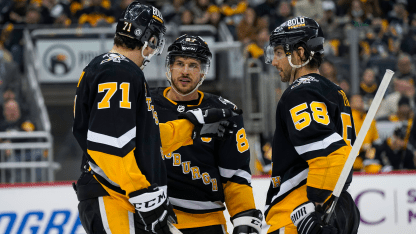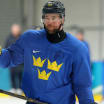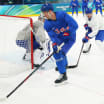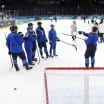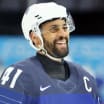MANALAPAN, Fla. -- Kyle Dubas has been open about his philosophy and plan for the Pittsburgh Penguins.
Stay relevant in the final seasons the Penguins have with Sidney Crosby, Evgeni Malkin and Kris Letang, get younger in the process.
"That is what anchors our decision-making, how can we be competitive now but also be ensuring that we aren't just layering quick fix on top of quick fix and then that leaves the Penguins in bad shape for the long run," said Dubas, who is in his first season as Penguins president of hockey operations and general manager. "That's been the full objective."
The problem is the Penguins in all likelihood will miss the Stanley Cup Playoffs for the second straight season. They are nine points out of a playoff position with 13 games left entering Sunday, when they play the Colorado Avalanche at Ball Arena (2 p.m. ET; SN-PIT, MAX, TNT, SN360, TVAS).
Dubas, though, remains steadfast in his approach despite that part of his job is to do things that fly in the face of what the Penguins legendary current players and a passionate fanbase may want or even understand.
Case in point: Jake Guentzel, the popular now-former Penguins forward who was traded along with defenseman Ty Smith to the Carolina Hurricanes on March 7 for forward Michael Bunting, forward prospects Ville Koivunen, Cruz Lucius and Vasily Ponomarev, and two conditional picks in the 2024 NHL Draft.
Guentzel was a Stanley Cup champion with the Penguins in 2017, a top player for eight seasons, arguably the best linemate Crosby has had. But he is on an expiring contract, 29 years old, 30 when next season begins, and a tradable asset to help the Penguins get younger.
Dubas caught heat in Pittsburgh for the trade. He expected it.
"You're trying to thread that needle, and when there are players who have that success in that marketplace anything you do that isn't seen as doing everything for them, it can be seen as a slight," he said. "I knew that coming in and that's part of the role. There are going to be hard decisions with some of this stuff that won't fit what the public and local groups or even people throughout the hockey would think is the best way to treat all those people who had success with the team. But you have to always anchor it with what's right for the long term of the Pittsburgh Penguins."
Balancing that is hard, Dubas said. It's a very thin needle to thread.
"It's not the binary, full-on contending or full-on rebuilding," he said. "It's something different. It's uncommon and there's not a crystal-clear view of how it is supposed to go timeline-wise or transaction-wise."
Which means Dubas likely will do more things people do not like, including many who have lived inside the walls of the Penguins organization for a long time.
"There are going to be times, a lot of times, where I will seek their opinion because I value it, but I may have to do something other than what their opinion is," Dubas said. "They're not going to be happy with me. But over time that's where, if our decision-making shows to be strong, then it's going to earn their trust and their respect. That's how we'll get it."
Dubas is aware of the risks, the most notable being the Penguins getting stuck in the murky middle of the NHL standings in the final seasons of the era of Crosby, Malkin and Letang.
Can that risk be mitigated?
"It's boring stuff that people don't really want to talk about, but when you talk about your player personnel, player development, R&D, your analytics department, high performance department, all of that has to be in lockstep and optimized," Dubas said. "It has to be to help us eliminate that kind of wandering in the wilderness period that is always a risk for teams that have had this long history of great success, and then because they rightfully push to try to go for it further and further you have that kind of dearth of prospects and draft capital."
But this is still all on Dubas. He's in charge, the 38-year-old who named himself GM on Aug. 3 after being hired as president of hockey operations June 1.
He's essentially alone on an island.
"That's OK," he said. "I'm fine with that."
He said it's different from his time with the Toronto Maple Leafs. He was hired there in 2014 as an assistant GM and got to spend three seasons working under Lou Lamoriello, who came in as GM in 2015, and eventually had enough knowledge to run the team himself in 2018 when he took over as GM.
"I was there the whole time," Dubas said. "This I'm coming in at a very different time, as the group has gotten older and the staff and players have been there for nearly two decades in some cases."
Dubas obviously had to handle criticism in Toronto too, but it was 13 years ago, when he was hired as GM of the Sault Ste. Marie Greyhounds in the Ontario Hockey League in 2011, that he learned how to handle criticism and be the GM making unpopular decisions for the future of the team.
"I was 25 and that's all there is in the city and everyone knows you and your family and they're very open because they come up to you and tell you why they disagree," he said. "I'm fortunate to have that experience and the experience in Toronto. We're going to make mistakes in this job, sometimes big, glaring ones, and people are going to be rightfully very critical of you, and the criticism is deserved. If you start to let that impact in the way you move ahead and lose faith in your own process and system, then you're done."
